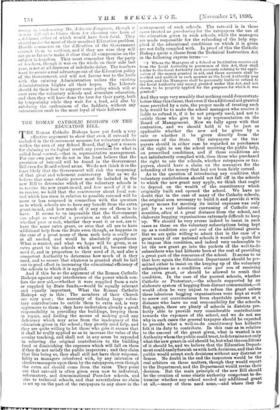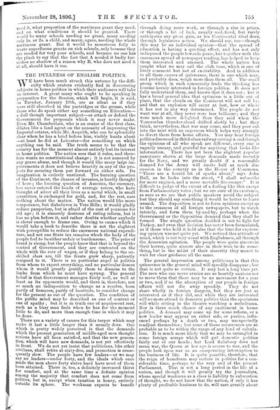THE ROMAN CATHOLIC BISHOPS ON THE EDUCATION BILL. T HE Roman
Catholic Bishops have put forth a very effective argument to show that even if rate-aid be included in the Government measure for voluntary schools within the area of any School Board, that i;,..not a reason for claiming as its logical result any provision for what is called local control,—that is, representative management. For our own part we do not in the least believe that the provision of rate-aid will be found in the Government Bill even for Board-school areas. We do not think it in the least likely that the Government will risk the reopening of that great and vehement controversy But as we do believe that some elastic power must be included in the new Bill to determine which of the voluntary schools is to receive the new grant-in-aid, and how much of it it is to receive, we hold that the controversy about local con- trol which has risen in relation to possible rate-aid will be more or less reopened in connection with the question as to which schools are to have any benefit from the extra grant-in-aid, and how much of it any one of them is to have. It seems to 'is impossible that the Government can adopt so wasteful a provision as that all schools, whether poor or rich, whether they want it or not, are tc have the same extra grant, or even that all are to have additional help from the State even though, as happens in the case of a great many of them, such help is teally not at all needed, and would be absolutely superfluous. What is wanted, and what we hope will be given, is an extra grant to the schools which need it, because they need it, and, in proportion to their need of it, and also a competent Authority to determine how much of it they need, and to secure that whatever is granted shall be laid out to good effect in increasing the educational efficiency of the schools to which it is applied. And if this be so the argument of the Roman Catholic Bishops against any interference of the power which con- fers the new aid,—whether it were supplied from a rate or supplied by State funds,—would be equally relevant and equally important. What the Roman Catholic Bishops say is this : The members of their Church are very poor ; the necessity of finding large volun- tary contributions to entitle them to extra aid, is very oppressive to them ; they have undertaken already a great responsibility in providing the buildings, keeping them in repair, and finding the means of making good any deficiency which may arise from the inadequacy of the education given in the school; they greatly need help, and they are quite willing to let those who give it ensure that it shall be really applied so as to increase the value of the secular teaching, and shall not in any sense be expended in relieving the original contributors to the building fund or diminishing the expenses which will fall on them if they do not satisfy the public inspectors ; and they claim that this being so, they shall still not have their responsi- bility as managers interfered with, by any intrusion of elective managers upon them by the ratepayers, even though the extra aid should come from the rates. They point out that rate-aid is often given even now to industrial, reformatory, and denominational Poor-law schools, and also to technical schools, and that nevertheless no claim is set up on the part of the ratepayers to any share in the inarrigement of such schools. The rate-aid is in these cases treated as purchasing for the ratepayers the use of the education given in such schools, while the managers are made responsible for the refunding of the help sup- plied if the educational conditions on which it is given are not fully complied with. In proof of this the Catholic Bishops quote a clause from the Technical Instruction Act in the following express terms "5 Where the Managers of a School or Institution receive aid from the Local Authority in pursuance of this Act, they shall render to the Local Authority such accounts relating to the appli- cation of the money granted in aid, and those accounts shall be verified and audited in such manner as the Local Authority may require, and the Managers shall be personally liable to refund to the Local Authority any money granted under this Act, and not shown to be properly applied for the purposes for which it was granted."
And they urge very sensibly that nothing could demonstrate better than this clause, that even if the additional aid granted were provided by a rate, the proper mode of treating such help would be to make the school managers who receive it liable to refund it, if it be not properly used, and not to entitle those who give it to any representation on the Board of Management. Now we fully agree with that contention, and we should hold it to be just as applicable whether the new aid be given by a rate or whether it be given directly from the resources of the State. The ratepayers or the tax- payers should in either case be regarded as purchasers of the right to use the school receiving the public help, on prescribed conditions, and if these conditions are not satisfactorily complied with, then those who purchased the right to use the schools, whether ratepayers or tax- payers, should have a claim on the managers for the refunding of the money that had not been fairly earned.
As to the question of introducing any condition that voluntary contributions should not fall off in the schools to which the new grant may apply, we think that ought to depend on the wealth of the constituency which originally built and opened the school. We have no doubt that in the case of many of the Catholic schools, the original sum necessary to build it and provide it with proper means for meeting its initial expenses was only got by a very laborious canvassing of Catholic com- munities, often at a great distance from the school, and elaborate begging organisations extremely difficult to keep up. We should be very averse indeed to insist in such cases as these on the voluntary subscriptions being kept up as a condition sine gwei non of the additional grants. But we are quite willing to admit that in the case of a great many of our national schools it would be quite fair to impose this condition, and indeed very undesirable to let the new grant go into the pockets of the well-to-do subscribers who had hitherto been at the cost of providing a great part of the resources of the school. It seems to us that here again the Education Department should be per- mitted either to insist on the keeping up of the voluntary subscriptions as a condition sine gud non of receiving the extra grant, or should be allowed to remit that condition. In the case of the poorest schools, whether Catholic or Protestant,—the schools supported by an elaborate system of begging from distant communities,—it would often be very unjust to refuse the grant unless these laborious begging organisations were kept at work to screw out contributions from charitable patrons at a distance who have no real responsibility for the schools. But, again, there are plenty of schools in districts per- fectly able to provide very considerable contributions towards the expenses of the school, and we do not see why in such cases the general taxpayer should be expected to provide what a well-to-do constituency has hitherto felt it its duty to contribute. In this case as in relation to the amount of the grant given, what is wanted is an Authority whom the public could trust, to determinenot only what the new grant-in-aid should be, but what the conditions of it should be, and we believe that the Education Depart- ment could easilyfurnish us with both decisions, and that the public would accept such decisions without any distrust or demur. No doubt in the end the inspectors would be the real arbiters on these matters, though they would report to the Department, and the Department would revise their decision. But the main principle of the new Bill should be the creation of some elastic authority competent to de- termine whether any school needed any additional grant at all,—many of them need none,—and where they do need it, what proportion of the maximum grant they need, and on what conditions it should be granted. There would be many schools needing no grant, many needing only is. or 2s. a child, and many, again, needing the whole maximum grant. But it would be monstrous folly to waste superfluous grants on rich schools, only because they are needed for very poor schools, and because no one has the pluck to say that the fact that A needed it badly fur- nishes no shadow of a reason why B, who does not need it at all, should have it too.











































 Previous page
Previous page